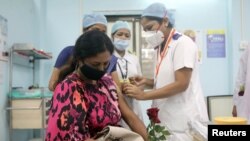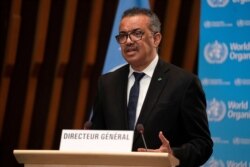The head of the World Health Organization says the world is “on the brink of a moral catastrophic failure” for its unequal sharing of COVID-19 vaccinations.
Addressing a WHO executive board meeting in Geneva on Monday, Executive Director Tedros Adhanom Ghebreyesus said it is “not right that younger, healthier adults in rich countries are vaccinated before health workers and older people in poorer countries.”
“More than 39 million doses of vaccine have now been administered in at least 49 higher-income countries. Just 25 doses have been given in one lowest-income country — not 25 million, not 25,000 — just 25,” he said.
Tedros said if rich countries do not share COVID-19 vaccines with poor countries, “this failure will be paid with lives and livelihoods.”
He said that ultimately, a "me-first approach" in distributing vaccines “will only prolong the pandemic.”
Later Monday, the White House confirmed that U.S. President Donald Trump had lifted coronavirus-related travel bans on most non-U.S. citizens arriving from much of Europe and Brazil, beginning January 26.
"This action is the best way to continue protecting Americans from COVID-19 while enabling travel to resume safely," Trump said in a statement released by the White House.
However, President-elect Joe Biden’s press secretary, Jen Psaki, responded a few minutes later on Twitter, saying: “On the advice of our medical team, the administration does not intend to lift these restrictions on 1/26. In fact, we plan to strengthen public health measures around international travel in order to further mitigate the spread of COVID-19.”
New guidelines by the U.S. Centers for Disease Control and Prevention, set to take effect January 26, will require all air passengers entering the U.S. to provide a negative COVID-19 test before boarding their flight.
Also Monday, an independent panel reviewing the global handling of the COVID-19 pandemic criticized both the World Health Organization and China for their response to the virus.
The panel of experts led by former New Zealand Prime Minister Helen Clark and former Liberian President Ellen Johnson Sirleaf said in an interim report that WHO should have declared an international emergency sooner than it did on January 30.
The panel also said China could have applied public health measures more strongly in January. The panel will present its completed report in May.
Earlier Monday, Japanese Prime Minister Yoshihide Suga vowed to forge ahead with preparations to hold the Tokyo Olympics this summer, despite a surge in coronavirus infections in the country.
"We will press ahead with preparations, with determination of building watertight anti-infection measures and holding an event that can bring hope and courage to the world," Suga said in a speech to Parliament.
A recent surge in cases in Japan has forced the government to close its borders to nonresident foreigners and to declare a state of emergency in the capital, Tokyo.
Recent media polls in Japan show about 80% of the Japanese public think the Olympics will not or should not be held this year.
The Tokyo Olympics have been postponed once because of the pandemic, having originally been scheduled for summer 2020.
In the Czech Republic, health officials say the fast-spreading coronavirus variant first identified in Britain has been detected in the country. Health Minister Jan Blatny said the variant accounts for about 10% of the samples tested. He did not say how many samples were genetically sequenced.
Several variants of the coronavirus have been detected around the world, including ones first identified in Britain, South Africa and Brazil.
Health officials in Brussels say the variant first detected in Britain has begun spreading in Belgium following more cases reported there.
“The variant has settled into our country,” virologist Marc Van Ranst told HLN network.
“Like in other nations, it is getting traction,” he added.
In Switzerland, authorities have placed two hotels in the skiing resort town of St. Moritz under quarantine and ordered all guests to be tested for the coronavirus after a person tested positive for the coronavirus variant first identified in South Africa.
In Italy, officials reported that the country’s daily caseload of coronavirus infections dropped below 10,000 on Monday. Officials confirmed 8,825 new cases.
French health officials began a campaign Monday to vaccinate people older than age 75. They say more than half a million people have registered to get the first of two vaccine shots by mid-February.
Chinese officials Monday recorded more than 100 new cases for the sixth consecutive day. Reuters news agency reported more than 29 million Chinese are now under strict lockdown to control the spread of the virus.
In the United States, the death toll from COVID-19 surpassed 398,000, according to data collected by Johns Hopkins University, the highest toll in the world.
Brazil and India follow the United States in COVID-19 deaths with more than 209,000 and 152,000, respectively.
Brazil approved two vaccines for emergency use against the coronavirus Sunday as some of its hospitals grappled with an oxygen shortage.









